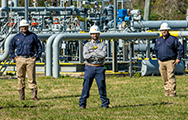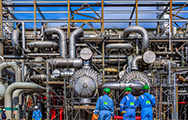Advancing diversity and inclusion
Our people
Our people are essential to the successful delivery of the Shell strategy and to sustaining business performance over the long term. We accelerate the development of our employees, grow and strengthen our leadership capabilities, and enhance employee performance through strong engagement.
In 2020, we worked hard to assist in the fight against COVID-19 and support our people in a range of ways. This included strengthening the country chair network so we could respond locally to the challenges of the pandemic and bringing together a global health alert monitoring team.
At December 31, 2020, there were a total of 87,000 employees in Shell. Shell expects to reduce between 7,000 and 9,000 jobs by the end of 2022, as it seeks to reduce costs and restructures with the aim of becoming a more streamlined, more competitive organisation that is nimbler and better able to respond to customers. Read more in the Employee overview section of our Annual Report.
Our people in 2020
Employees
employees at December 31, 2020
Region
countries in which we operate
Training
formal training days for employees and joint-venture partners
Female employees
female employees
Directors
women on the Board of Directors
Senior leaders
women in senior leadership positions
Experienced hires
experienced people joined Shell (31% female)
Operations centre hires
recruited for Shell Business Operations centres (50% female)
Graduate hires
graduate hires (49% female)
[A] All metrics except the employees metric exclude the employees in certain Upstream, Renewables and Energy Solutions and Downstream companies that maintain their own HR systems.
[B] As part of its restructuring plans, Shell expects to reduce 7,000-9,000 jobs by the end of 2022.
Employee engagement
The Shell People Survey is one of our principal tools to measure employee engagement, motivation, affiliation and commitment to Shell. It provides insights into employees’ views and has had a consistently high response rate.
In 2020, the response rate was 86.1%, our highest ever level and an increase of 0.6 percentage points compared with 2019. The average employee engagement score was 78 points out of 100, the same as in 2019, which places us among the leading companies across a range of industries.
Workforce diversity and inclusion
Our diversity and inclusion approach focuses on hiring, developing and retaining the best people.
Embedding the principles of diversity and inclusion in the way we do business gives us a better understanding of the needs of our people, partners, suppliers and customers. A diverse workforce, supported by an inclusive and caring environment that respects and nurtures diverse people, is a way to improve our safety and business performance.

Colleagues from Shell’s digital team working in London, UK, before the COVID-19 lockdowns.
We continue our focus on attracting, developing and promoting more women, and we are supporting initiatives that encourage girls to study science, technology, engineering and mathematics. We also do this by creating a culture of respect and inclusion.
At the end of 2020, the proportion of women in senior leadership positions was 27.8%, an increase of 1.4 percentage points compared with the end of 2019. We are working to achieve 30% representation of women in senior leadership positions by the end of 2021, 35% by 2025 and 40% by 2030.
Shell's Chief Executive Officer Ben van Beurden is a member of the Catalyst CEO Champions for Change, a group of more than 50 CEOs who pledge to support women’s advancement at all levels of leadership.
Shell is a member of the disability campaign The Valuable 500, which seeks to eliminate the exclusion of disabled people worldwide and ensure disability inclusiveness remains a priority for global business leaders. Our workplace accessibility service currently serves 83 locations globally. The service is designed to ensure that all employees have access to reasonable physical workplace or other adjustments so that they can work effectively and productively.
In 2020, we established a Care-for-Self programme to encourage staff to pay attention to their physical and mental well-being, and to support them as they did so. This was considered particularly important given the stresses placed on staff by the COVID-19 pandemic and lockdowns.
At Shell, we support and enable people from every background, and strive to be a leader in lesbian, gay, bisexual and transgender (LGBT+) inclusion in the workplace. We have pledged support for the UN LGBTI Standards of Conduct for Business. We benchmark ourselves externally with consistent top-tier results. For example, in 2020 in the USA we earned a 100% score in the Human Rights Campaign Foundation’s Corporate Equality Index, a recognition we have earned annually since 2016. In 2020, Shell has again been benchmarked as a top employer in the Workplace Pride Global inclusive workplace benchmark survey.
We also created a global LGBT+ forum that is backed by members of Shell’s Executive Committee and comprises LGBT+ colleagues and others at Shell seeking to help or who have a common interest in the advancement of LGBT+ inclusion. The forum is active in a number of areas. It is, for example, strengthening our approach to developing talent and cooperating across industry and non-governmental organisations.
Shell has established a global Diversity & Inclusion Council for Race, sponsored by our CEO Ben van Beurden. The council aims to build on our actions to advance diversity in our workforce so it better reflects communities where we work and from which we draw talent. While seeking to drive change across the organisation, the council has identified the USA and the UK as the focus of much of its initial efforts to address diversity and inclusion challenges.
We use our Shell People Survey as a key measure of success for diversity and inclusion, striving each year for consistently high engagement scores from staff. In 2020, the survey results related to this topic showed an increase of one point to 84. For 2021, the survey questions will be updated so that employees can provide further feedback on diversity and inclusion.
New energy skills
As we grow our Renewables and Energy Solutions business (formerly New Energies), with investments in low-carbon technologies such as electric-vehicle charging and wind power, Shell and its employees will require new skills. We will focus on attracting and developing talented people with the right knowledge and skills, and will support staff to gain skills and retrain, for a world of increasing energy transition.
The Paris Agreement cites just transition as an essential part of climate action by governments, including a focus on the creation of decent work and quality jobs. You can read more about our approach to just transition on www.shell.com/energy-and-innovation/the-energy-future/a-fair-and-just-transition
Read more in Shell’s response to COVID-19.




